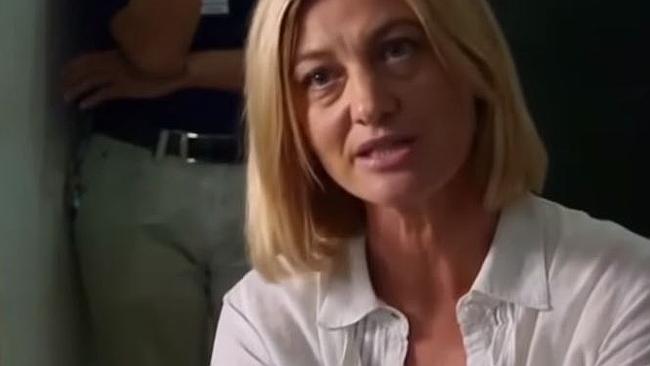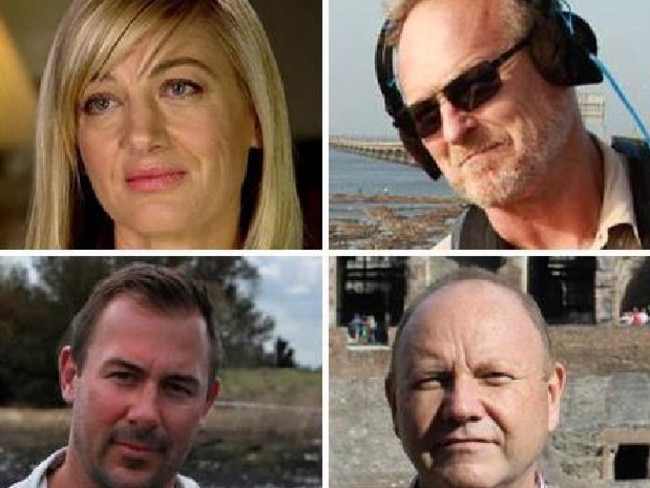Behind the scenes at 60 Minutes: ‘If they didn’t take risks they wouldn’t have a show’.
JOBS are in danger at Channel 9 as the network starts to investigate who’s to blame for the disaster at 60 Minutes.

IT’S one of the most desirable jobs in Australian media but reporting for 60 Minutes is also one of the most dangerous gigs in the business, according to an insider.
Brisbane mother Sally Faulkner, two members of a UK-based child recovery agency, two Beirut locals and a 60 Minutes Australia team are currently languishing in a Lebanese jail following their failed attempt to retrieve Ms Faulkner’s two young children.
The high-risk nature of the operation has prompted many questions as to why the Nine Network authorised the 60 Minutes team — made up of star reporter Tara Brown; senior producer Stephen Rice; cameraman Ben Williamson; and sound recordist David Ballment — to go on the assignment in the first place.
The group has been charged with conspiracy to commit a crime, kidnapping and physical assault and are awaiting another court appearance before a judge on Monday. The offences carry jail terms of up to 20 years.
It’s far from being the first time a 60 Minutes crew has run into trouble on assignment but until now there have never been any serious consequences, according to an insider.
The Australian reported that heads are expected to roll at the Nine Network as the broadcaster begins the internal process of naming and shaming guilty parties in the international incident.
“Insiders said a group of current and former executive and producers were coming under increasing scrutiny over a botched child-abduction attempt,” The Australian reported.
A former 60 Minutes staffer told news.com.au the program’s crews were often put in high-risk situations, including reporting from the frontline in Syria, but that it was the nature of the job.
“If they didn’t take risks they wouldn’t have a show,” they said.
“Crews definitely don’t expect to be arrested, but they know they often have to take risks … to get the job done and tell incredible stories.
“The reporters and producers have to be brave, but the executive producer has to be braver. Because if anything goes wrong, it comes back to them.”
The 60 Minutes team reportedly started working on the story last year with Ms Faulkner under former executive producer Tom Malone. The current EP is Kirsty Thomson, who took over the reins when Mr Malone was promoted to director of sport in February this year.
There is still speculation surrounding whether or not Nine made an alleged payment of $120,000 to the specialist child-recovery agency involved in the child snatch scandal. The network has declined to comment on the matter.
The insider said it was generally the producers who pitched story ideas and their job to do most of the research and planning for each assignment.
“Reporters are often quite involved and Tara (Brown) is always very thorough,” they said.
“At each stage of the process — idea formation, confirmation of talent and then just before they travel — the producer and reporter sit down with the 60 Minutes executive producer and chief of staff and go through what they plan to film.
“Sometimes the camera crew are brought in for the final meeting, especially if the story could be dangerous.
“The cameraman and sound recordist are often given very little notice of stories and mostly aren’t involved in the planning …(they) have very minimal input.”

The insider said private security contractors were often brought in during the planning process to discuss risk management.
“They spare no expense on risk management, often hiring ex-SAS soldiers to accompany them to dangerous places,” they said.
According to the source, there is no rule book when it comes to planning assignments. Every case is different.
“Risks are mitigated as much as they can be but if any normal health and safety tests had to be conducted (the crews would) never leave the office,” they said.
“It’s finding a balance between telling important stories with acceptable risk and being cowboys. And they’re not cowboys.”
News.com.au understands 60 Minutes crews have taken part in “hostile environment training” where they were taught how to respond to dangerous situations.
“We’ve all seen the stories 60 Minutes has produced,” the source said.
“Crews have previously been shot at and they’ve had too many close calls to count.
“They’ve been to countless war zones and often find themselves in the middle of conflict.
“It’s what they do.”
Judge Abdullah said the case would be adjourned and the group will be detained for at least another five days.
“There is no way for charges to be dropped, there is violence of Lebanese authority by all these people, okay, this is a crime okay,” he said in his chambers.
The insider said the 60 Minutes team was “like a family” because they lived and worked with each other around the clock for six months every year.
“It has to be one of the closest workplaces in Australia,” they said.
“Crews spend months together on the road working together in often dangerous places and eating breakfast, lunch and dinner together.
“They’re all going to be shattered until their friends come home.”




